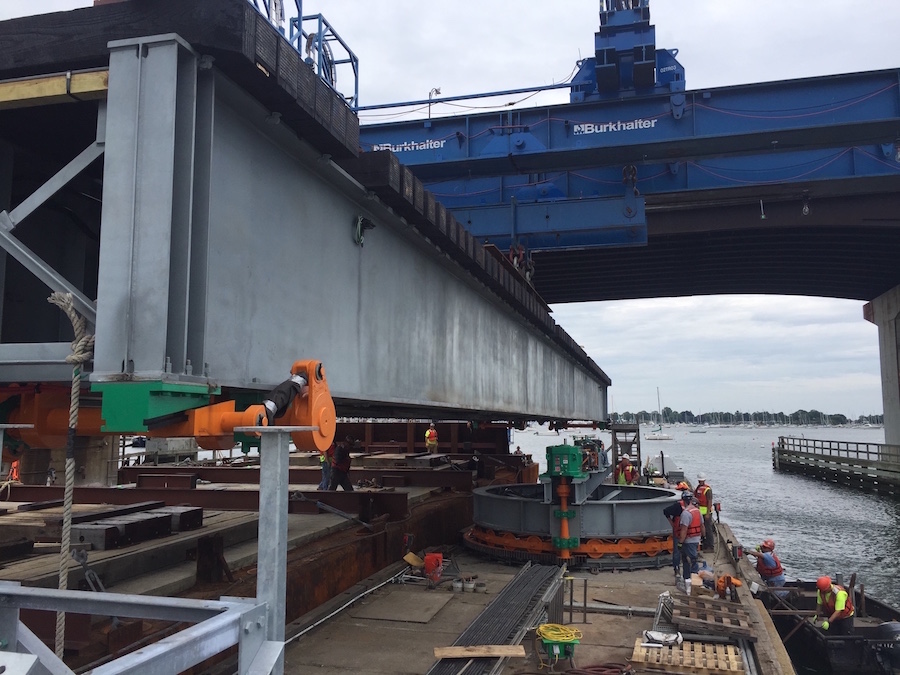Federally-mandated positive train control work to prevent train collisions and overspeed derailments on Boston-area commuter rail lines is progressing ahead of schedule, according to the Massachusetts Bay Transportation Authority.
This is critical work for the MBTA, which is leading the nation in derailments with seven MBTA Green Line derailments in 2015 and six on Green Line trolleys in 2016, but no injuries or delays. The MBTA reports no mainline derailments have occurred since Nov. 2016.
PTC, a safety control system, mandated by the Federal Rail Administration, under the Rail Safety Control Act of 2008, automatically reduces train speeds when needed, reducing train collisions and preventing human error, according to the MBTA. All PTC systems are generally comprised of an on-board apparatus for the locomotive controlling each applicable train, wayside devices (such as wayside interface units), a centralized dispatch system in a back office, and a communication system that links all components.
“PTC installation started in May… and “we’ll be installing, testing and commissioning on 13 commuter rail lines through [the federal deadline of] Dec. 31, 2020,” says Karen Antioch, PTC program manager for the MBTA. Antioch was hired by the MBTA in June after managing the Caltrans PTC project. Fines of $105,000 per day can be imposed if specific requirements, including federal deadlines, are not met.
“Logistics is the single largest challenge for the installation work on an active railroad, in addition to permitting, Antioch says. “We’ve gone through an extensive permitting process, a portion of which is overseen by the Federal Communications Commission.”
The PTC program includes a third-party PTC systems integrator contract with Ansaldo Signaling and Transportation Systems and with MBTA railroad operator, Keolis Commuter Services, according to a March 7 MBTA news release. The PTC implementation plan includes acquiring a spectrum through PTC 220 LCC or a frequency swap with the FCC; the installation of 180 PTC antennas, 250 PTC wayside installations, and 4,500 PTC transponders; new optical fiber installations (including 230 miles of new pole routes and 50 miles of restored/existing pole routes); and PTC installation in 100 MBTA locomotives, twenty-five Pan Am locomotives, and 114 cab cars. The Implementation Plan also includes upgrades to dispatch centers.
The scope of work for Ansaldo includes design, installation testing and commissioning of positive train controls, Antioch says. That $338 million project—an overlay for the signaling system—is more of a systems project than a construction project, Antioch says. The total PTC program cost is $459 million. In addition to Ansaldo’s work, the MBTA program management team has engaged HNTB and LTK to represent the MBTA interest and oversee Ansaldo’s work on the project.
PTC design work is substantially complete and field installation is progressing two lines at a time on the commuter rail lines with testing soon to begin, Antioch says. “We managed to come across rock in Rockport, she quipped, “so have had to drill rock in places for installing poles.”
The Newburyport/Rockport Commuter Rail Line work began on July 8 and is scheduled to finish by Aug. 27, one month ahead of schedule, allowing for work on the Needham Line to begin early on Sept 2, according to an Aug. 9 MBTA statement. Work also began on the New Hampshire/Maine line, also known as the Lowell Line, on August 5, one of two pilot lines, Antioch says.
There are typically five crews per shift working 24/7 on each line mostly during weekend closures, Antioch says. “We’re installing fiberoptic cable along each line to support the PTC system,” she says. “Crews are installing 30-ft poles for mounting the cable and doing civil work for installing antennas, part of the PTC system, in addition to installing signal houses or signal cases.”
To meet the federal deadline for PTC installation, the entire commuter rail line needs to be shut down on weekends for crews to work as efficiently as possible, according to the MBTA.
In other critical projects on the Newburyport/ Rockport Line, J.F. White crews are finishing work on the $16.2 million replacement of the deteriorating 132-year-old Beverly Drawbridge that carries commuter trains over the Danvers River in Beverly. Weekday train service resumed on Aug. 14, following a 28-day shutdown of all Newburyport/Rockport Line service north of Salem required to replace the swing-span bridge in Beverly and conduct follow-up alignment and testing work, according to the MBTA.
Final completion is scheduled for Dec. 23, according to Lisa Battiston, MBTA spokeswoman. “The new bridge, which has performed very well, has hundreds of components, and minor engineering adjustments expected in the initial weeks of operation—all standard procedure,” she said.
Delays riders experienced on Aug. 18, “involved human error by the bridge operator,” she said. “There were no defects with the span.”
“The ongoing infrastructure work on the Newburyport/Rockport Line reflects the MBTA’s new approach to capital spending,” said interim MBTA General Manager Steve Poftak. “This fiscal year alone nearly $800 million is targeted toward projects that will improve reliability and enhance safety throughout the system.”
In addition to replacing the Beverly drawbridge, Keolis, MBTA and other construction teams during a recent daytime closure on the Newburyport/Rockport Line replaced 12,000 railroad ties between North Beverly and Ipswich, including installing 2,800 tons of ballast, upgraded sections of the Rockport layover facility, and replaced five culverts, among other work, he said.




Post a comment to this article
Report Abusive Comment